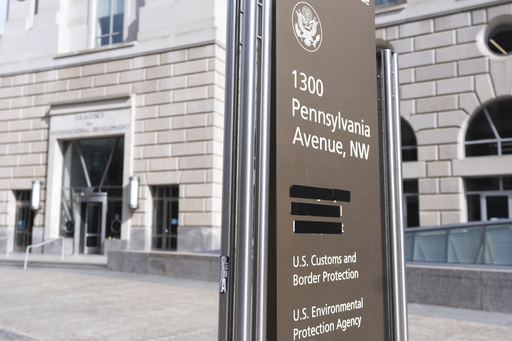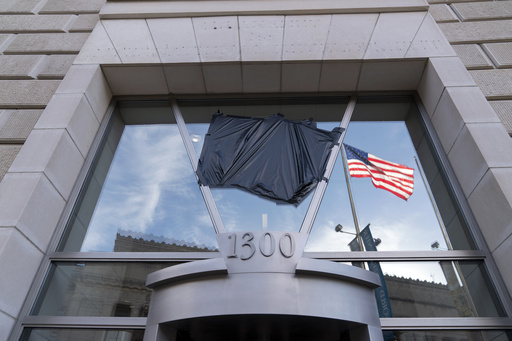A federal judge on Friday issued a major setback to President Donald Trump and his ally Elon Musk, ordering a temporary halt to the administration’s efforts to dismantle the U.S. Agency for International Development. The ruling blocks plans to remove thousands of agency staffers and prevents overseas employees from being forced to return to the U.S. within 30 days.
U.S. District Judge Carl Nichols, a Trump appointee, ruled that the administration’s rush to shut down USAID exposed workers and their families to unnecessary risks. The court also heard reports that some employees had been cut off from government communication systems, making it impossible for them to reach the U.S. government in case of emergencies.

USAID workers left stranded as communication is severed
The Associated Press previously reported that USAID contractors, particularly in the Middle East, had their emergency “panic button” apps wiped from their phones when they were abruptly furloughed. The judge noted that placing workers on administrative leave in conflict zones like Syria was not the same as doing so in a safe environment like Bethesda, Maryland.
Trump’s executive order had already resulted in USAID workers being locked out of agency systems and losing access to government resources. Democratic lawmakers accused the administration of physically removing computer servers from agency offices.
Trump’s push to eliminate foreign aid faces backlash
The move to dismantle USAID has sparked lawsuits from federal worker groups who argue that Trump lacks the authority to close the agency without congressional approval. Despite this, the administration has already stopped funding development programs worldwide and placed staff on furlough.
The American Foreign Service Association and the American Federation of Government Employees filed suit, while congressional Democrats echoed concerns that the administration’s rapid dismantling of the agency violated federal law.
Trump, however, remains committed to shutting down USAID, declaring on social media, “CLOSE IT DOWN,” just hours before the judge’s ruling.
Shutdown disrupts critical aid programs
USAID officials strongly disputed claims from Secretary of State Marco Rubio that essential programs were still receiving funding. They stated that no waivers had been granted, leaving critical services unfunded, including a $450 million U.S. food aid program meant to feed 36 million people and water supplies for 1.6 million displaced individuals in Sudan’s Darfur region.
ALSO: A federal judge early Saturday issued a preliminary injunction preventing Elon Musk’s Department of Government Efficiency (DOGE) from accessing Treasury Department records that contain sensitive personal data, including Social Security numbers and bank account details for millions of Americans.
Legal challenge halts musk’s access to financial data
U.S. District Judge Paul A. Engelmayer ruled in favor of 19 Democratic attorneys general who sued President Donald Trump, arguing that Musk’s team was unlawfully granted access to the Treasury Department’s central payment system. The lawsuit, filed in federal court in New York City, contends that this access violates federal law.
The Treasury’s payment system processes tax refunds, Social Security and veterans’ benefits, and other federal payments, amounting to trillions of dollars annually. It also stores an extensive network of Americans’ financial and personal data.
Engelmayer, an Obama appointee, also ordered that anyone who has accessed the Treasury’s sensitive information since January 20 must immediately delete all copies of the data. A hearing on the matter is set for February 14.
White House remains silent as concerns grow
The White House has not responded to requests for comment on the lawsuit.
DOGE, created by the Trump administration to identify and cut what it considers excessive government spending, has drawn sharp criticism for its sweeping powers. While its supporters praise Musk’s efforts to curb waste, critics warn of the risks associated with a private citizen having unrestricted access to federal financial systems.
Musk has dismissed concerns about DOGE on his X platform, claiming it is saving taxpayers millions.
Attorneys general warn of security risks
New York Attorney General Letitia James, who led the lawsuit, raised concerns that DOGE’s access to Treasury records poses major security risks and could lead to an illegal freeze on federal funds.
“This unelected group, led by the world’s richest man, is not authorized to have this information,” James said in a video statement. “They explicitly sought this unauthorized access to illegally block payments that millions of Americans rely on, including funds for health care, child care, and other essential programs.”
James also accused Trump of overstepping his authority. “The president cannot simply hand over Americans’ private financial data to anyone he chooses, nor can he cut federal payments approved by Congress.”
States push back against Trump’s plan
The lawsuit, joined by attorneys general from Arizona, California, Colorado, Connecticut, Delaware, Hawaii, Illinois, Maine, Maryland, Massachusetts, Minnesota, Nevada, New Jersey, North Carolina, Oregon, Rhode Island, Vermont, and Wisconsin, argues that DOGE’s access to Treasury records oversteps legal boundaries.
The suit contends that DOGE’s interference could disrupt congressional funding, violating federal law and the constitutional separation of powers. Treasury Secretary Scott Bessent is also accused of changing long-standing data protection policies to accommodate DOGE.
Largest data breach in U.S. history?
Connecticut Attorney General William Tong warned that the implications of this breach remain unknown.
“This is the largest data breach in American history,” Tong stated. “DOGE is an unlawfully constituted band of renegade tech bros combing through confidential records, sensitive data, and critical payment systems. What could go wrong?”
Uncertainty over how musk’s team is using data
The Treasury Department has insisted that DOGE’s review is about assessing system integrity and that no modifications have been made. However, sources familiar with the situation say Musk’s team initially focused on ways to suspend payments made by the U.S. Agency for International Development (USAID), which Trump and Musk are working to dismantle.
Mounting pressure for oversight
Democratic lawmakers have called for a Treasury Department investigation into DOGE’s activities, while labor unions and advocacy groups have filed lawsuits challenging the legality of its review.
A judge in Washington recently restricted access to Treasury records, limiting it to two DOGE employees with “read-only” privileges.
With legal battles mounting and scrutiny intensifying, Musk’s unchecked influence over federal operations faces increasing resistance.
Uncertainty looms as administration pushes forward
Despite the judge’s temporary block, the Trump administration has already taken symbolic steps to erase USAID, including removing its name from the agency’s Washington headquarters and taking down USAID flags.
The administration is considering shifting some aid programs under the State Department, though officials fear further staff reductions after Trump’s push for voluntary resignations among federal workers. A separate court order has temporarily blocked that plan, with another hearing set for Monday.
Trump’s allies insist that U.S. foreign aid will continue, but only under a new framework aligned with national interests. However, for the thousands of USAID workers now caught in legal limbo, the future remains uncertain.




